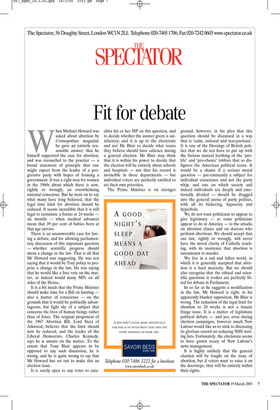Fit for debate
When Michael Howard was asked about abortion by Cosmopolitan magazine he gave an entirely reasonable answer: that he himself supported the case for abortion, and was reconciled to the practice — a broad statement of principle that one might expect from the leader of a progressive party with hopes of forming a government. It was a right won for women in the 1960s about which there is now, rightly or wrongly, an overwhelming national consensus. But he went on to say what many have long believed, that the legal time limit for abortion should be reduced. It seems incredible that it is still legal to terminate a foetus at 24 weeks six months — when medical advances mean that 39 per cent of babies born at that age survive.
There is an unanswerable case for having a debate, and for allowing parliamentary discussion of this important question — whether scientific progress should mean a change in the law. That is all that Mr Howard was suggesting. He was not saying that it would be Tory policy to propose a change in the law. He was saying that he would like a free vote on the matter, as indeed would many MPs on all sides of the House.
It is a bit much that the Prime Minister should make time for a Bill on hunting also a matter of conscience — on the grounds that it would be politically advantageous, but fight shy of a subject that concerns the lives of human beings rather than of foxes. The original proponent of the 1967 Abortion Bill, Lord Steel of Aikwood, believes that the limit should now be reduced, and the leader of the Liberal Democrats, Charles Kennedy, says he is unsure on the matter. To the extent that Tony Blair appears to be opposed to any such discussion, he is wrong, and he is quite wrong to say that Mr Howard has set out to make this an election issue.
It is surely open to any voter to cate chise his or her MP on this question, and to decide whether the answer given is satisfactory; and it is up to the electorate and not Mr Blair to decide what issues they believe should have salience during a general election. Mr Blair may think that it is within his power to decide that the election will be entirely about schools and hospitals — not that his record is invincible in these departments — but individual voters are perfectly entitled to set their own priorities.
The Prime Minister is on stronger ground, however, in his plea that this question should be discussed in a way that is ‘calm, rational and non-partisan’. It is one of the blessings of British politics that we do not have to put up with the furious mutual loathing of the ‘prolife’ and ‘pro-choice’ lobbies that so disfigures the American political scene. It would be a shame if a serious moral question — pre-eminently a subject for individual conscience and not the party whip, and one on which society and indeed individuals are deeply and emotionally divided — should be dragged into the general arena of party politics, with all its bickering, hypocrisy and hyperbole.
We do not want politicians to appear to give legitimacy — as some politicians appear to do in America — to the attacks on abortion clinics and on doctors who perform abortions. We should accept that our law, rightly or wrongly, will never have the moral clarity of Catholic teaching, with its insistence that abortion is tantamount to murder.
We live in a sad and fallen world, in which it is generally accepted that abortion is a hard necessity. But we should also recognise that the ethical and scientific questions it evokes are perfectly fitted for debate in Parliament.
In so far as he suggests a modification in the law, Mr Howard is right; in his apparently blanket opposition, Mr Blair is wrong. The reduction of the legal limit for abortion to 20 weeks is not a lunatic fringe issue. It is a matter of legitimate political debate — and yes, even during election campaigns, however much New Labour would like us to stick to discussing its glorious record on reducing NHS waiting lists. Fortunately, the electorate seems to have grown weary of New Labour’s news management.
It is highly unlikely that the general election will be fought on the issue of abortion, but if voters want to raise it on the doorsteps, they will be entirely within their rights.
















































 Previous page
Previous page